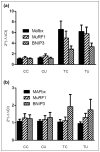Ubiquinol reduces muscle wasting but not fatigue in tumor-bearing mice
- PMID: 25230747
- PMCID: PMC4363037
- DOI: 10.1177/1099800414543822
Ubiquinol reduces muscle wasting but not fatigue in tumor-bearing mice
Abstract
Purpose: Fatigue is the most common and distressing symptom reported by cancer patients during and after treatment. Tumor growth increases oxidative stress and cytokine production, which causes skeletal muscle wasting and cardiac dysfunction. The purpose of this study was to determine whether treatment with the antioxidant ubiquinol improves muscle mass, cardiac function, and behavioral measures of fatigue in tumor-bearing mice.
Method: Adult female mice were inoculated with colon26 tumor cells. Half the control and tumor-bearing mice were administered ubiquinol (500 mg/kg/day) in their drinking water. Voluntary wheel running (i.e., voluntary running activity [VRA]) and grip strength were measured at Days 0, 8, 14, and 17 of tumor growth. Cardiac function was measured using echocardiography on Day 18 or 19. Biomarkers of inflammation, protein degradation, and oxidative stress were measured in serum and heart and gastrocnemius tissue.
Results: VRA and grip strength progressively declined in tumor-bearing mice. Muscle mass and myocardial diastolic function were decreased, and expression of proinflammatory cytokines was increased in serum and muscle and heart tissue on Day 19 of tumor growth. Oxidative stress was present only in the heart, while biomarkers of protein degradation were increased only in the gastrocnemius muscle. Ubiquinol increased muscle mass in the tumor-bearing and control animals but had no effect on the expression of biomarkers of inflammation, protein degradation, or oxidative stress or on behavioral measures of fatigue.
Keywords: cancer-related fatigue; colon26 adenocarcinoma; mice; oxidative stress; tumor growth; ubiquinol.
© The Author(s) 2014.
Conflict of interest statement
The author(s) declared no potential conflicts of interest with respect to the research, authorship, and/or publication of this article.
Figures



References
-
- Amir Z, Wilson K, Hennings J, Young A. The meaning of cancer: Implications for family finances and consequent impact on lifestyle, activities, roles and relationships. Psycho-Oncology. 2012;21:1167–1174. - PubMed
-
- Berger AM, Abernethy AP, Atkinson A, Barsevick AM, Breitbart WS, Cella D, Wagner LI. Cancer-related fatigue. Journal of the National Comprehensive Cancer Network. 2010;8:904–931. - PubMed
-
- Cobanoglu U, Demir H, Cebi A, Sayir F, Alp HH, Akan Z, Bakan E. Lipid peroxidation, DNA damage and coenzyme q10 in lung cancer patients—markers for risk assessment? Asian Pacific Journal of Cancer Prevention. 2011;12:1399–1403. - PubMed
Publication types
MeSH terms
Substances
Grants and funding
LinkOut - more resources
Full Text Sources
Other Literature Sources
Medical

